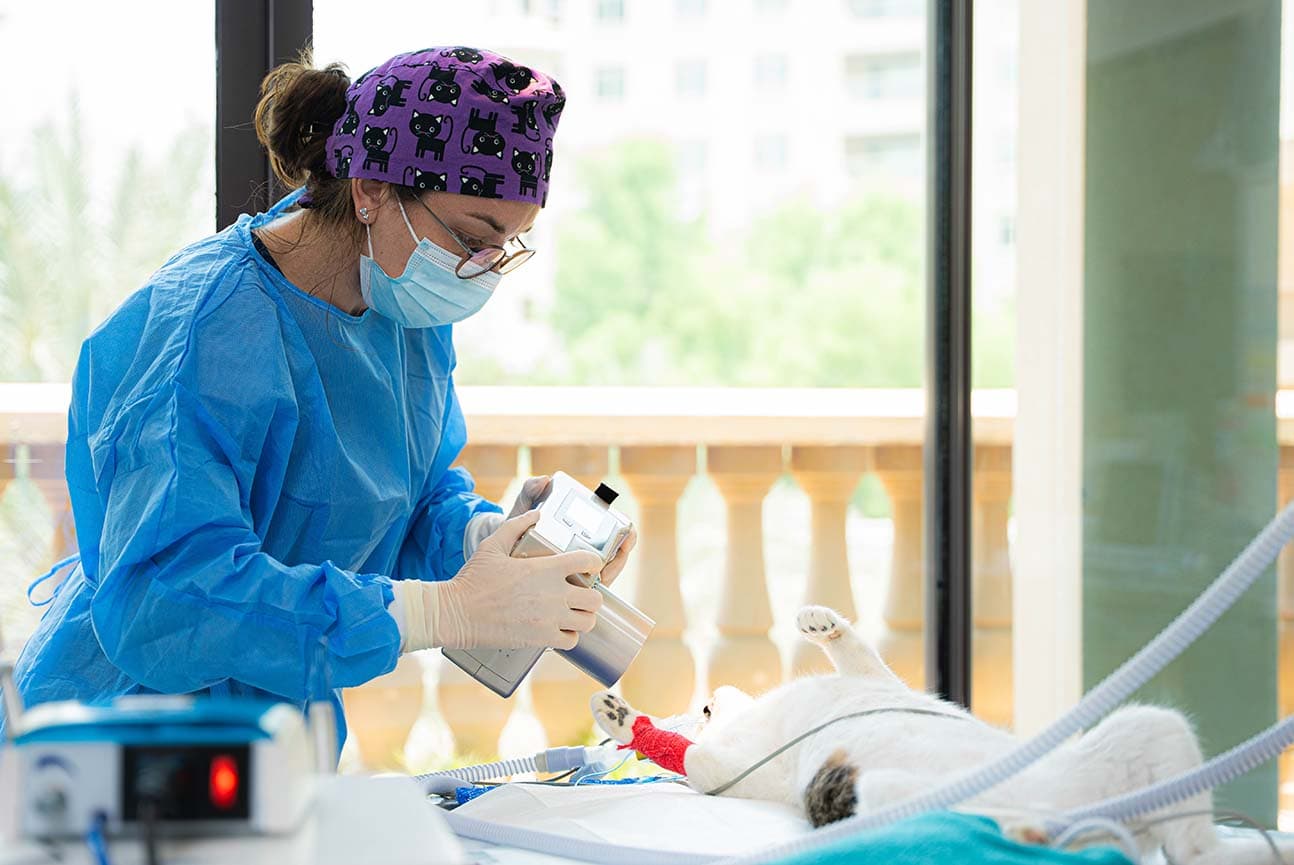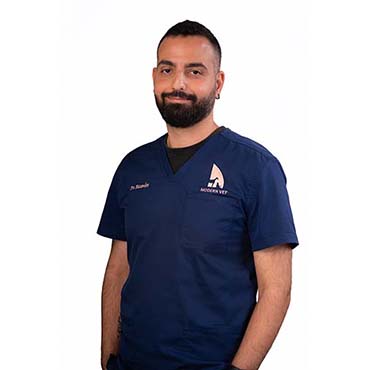Reviewed by Dr. Ricardos Saad
Updated on 08/10/2025
Reading time 4 min.
Overview
Severity: Low
Life stage: All
Abscesses in cats are painful, pus-filled swellings caused by bacterial infections that can appear anywhere on their body. These infections affect cats of any age and are particularly common in cats with outdoor access in Dubai, due to territorial fighting between cats in densely populated residential areas. Most abscesses are straightforward to treat when caught early, but some internal types can become life-threatening without prompt veterinary care. Dubai’s year-round warm weather and high stray cat population create unique challenges for cat owners, making awareness of abscess prevention and treatment essential for your pet’s well-being.
What to do if you think your cat has an abscess
If you suspect your cat has an abscess, contact a veterinarian immediately. Abscesses are painful and typically require prescription medication for effective treatment.
While waiting for your veterinary appointment:
- Apply warm compresses to external swellings for 10-15 minutes, 2-3 times daily
- Clean any discharge gently with cooled, boiled water to prevent crusting
- Use a cone collar or medical suit to prevent licking and self-trauma
- Provide a quiet, cool area for rest
- Monitor eating and drinking habits carefully
- Keep your cat indoors to prevent further injury
Safety considerations: Handle your cat carefully, as pain may cause normally gentle cats to become aggressive. If your cat shows defensive behaviour during your attempts to apply care, stop handling and seek immediate veterinary attention.
Modern Vets’ excellent 24-hour emergency veterinary services ensure professional care is available when urgent treatment is needed.
Causes of abscesses in cats
Dubai’s climate and the way cats interact with each other can both play a role in the types of abscesses they develop.
Cat bite abscesses (most common):
- Territorial disputes between neighbourhood cats
- Mating season conflicts during cooler months
- Competition for food sources around apartment complexes
Other skin abscesses:
- Foreign body penetrations, such as grass seeds, thorns, or sharp objects such as glass
- Bite or fight wounds from other animals
- Scratches from rough surfaces or balcony accidents
- Contaminated wounds in Dubai’s dusty environment
Tooth root (dental) abscesses:
- Poor oral hygiene worsened by Dubai’s dry climate
- Severe periodontal disease
- Broken teeth from fights or falls
- Bacterial infection of the tooth roots
Additional causes:
- Anal gland abscesses from impacted or infected glands
- Secondary infections from tumours
- Post-surgical complications at operation sites
- Internal abscesses from bacterial spread through the bloodstream
Dubai’s high-density living and year-round breeding season intensify territorial behaviour, increasing the frequency of fight-related abscesses.
When to worry about abscesses in cats
Contact your veterinarian immediately if your cat:
- Shows obvious pain or distress when touched
- Stops eating or drinking for more than 24 hours
- Has difficulty breathing, fast or open-mouth breathing
- Develops a high fever with extreme lethargy
- Has multiple swellings appearing simultaneously
Schedule the next available appointment if your cat:
- Develops facial swelling, especially below the eyes
- Is drooling excessively or having difficulty swallowing
- Is limping or reluctant to move
- Has open wounds with foul-smelling discharge
- Shows behavioural changes, including hiding or aggression
Recommended products
Essential supplies for managing cat abscesses in Dubai include:
Wound care essentials
- Sterile saline solution for gentle cleaning
- Cone collars or medical suits in the correct size
- Antiseptic wipes safe for use with cats
Comfort items
- Cooling mats suitable for Dubai’s climate
- Soft, elevated bedding for comfortable rest
- Non-slip feeding stations for stability
- Enclosed, quiet spaces for recovery, away from other pets
Preventive care
- Cat-specific enzymatic toothpaste and soft brushes
- High-quality veterinary-approved dental treats
- Fibre supplements for anal gland health
- First aid supplies, including a digital thermometer
How to prevent abscesses in cats
Preventing abscesses involves managing Dubai’s environmental and social challenges.
Territorial management:
- Keep cats indoors, especially during the hours when activity is greatest
- Install secure balcony enclosures for safe outdoor access
- Use pheromone diffusers to reduce territorial stress
- Supplement ‘vertical territory’ with climbing structures and cat trees
Wound prevention:
- Examine your cat weekly for cuts, scratches or puncture wounds
- Seek immediate veterinary attention for any animal bite injuries
- Remove foreign objects, like grass seeds, from your cat’s coat after going outdoors
- Treat minor wounds promptly, before they become infected
Healthcare:
- Schedule dental check-ups every 6-12 months with your vet
- Brush teeth regularly with cat-friendly products
- Check for signs of anal gland problems, especially in predisposed cats
- Feed a high-quality diet to keep your cat in top condition
Benefits of neutering:
- Reduces roaming behaviour and territorial fighting
- Decreases hormone-driven aggression
- Lowers the risk of bite wounds from mating conflicts
How vets diagnose abscesses in cats
Physical examination:
- Thorough inspection of affected areas
- Gentle palpation to assess size, consistency and how painful the area is
- Checking temperature to rule out systemic illness
- Evaluation of the health of the surrounding skin/tissue
Diagnostic procedures:
- Fine needle aspiration for bacterial culture and sensitivity testing of abscess contents
- Blood tests: assessing white (defensive) cell counts and organ function
- Urinalysis: checking a urine sample when urinary symptoms are present
- Imaging: ultrasound, x-rays, for internal abscesses
- Advanced imaging: CT, MRI for complex cases
Specific assessments:
- Dental x-rays for suspected tooth root abscesses
- Microscope exam of samples of discharge: checking what cells are present
- Allergy testing: if skin abscesses are recurrent
How to care for a cat with an abscess at home
Following veterinary treatment, supportive home care helps speed up your cat’s recovery.
Giving medication:
- Give antibiotics exactly as prescribed by your vet and always complete the course
- Give pain medications with food to prevent stomach upset
- Contact your vet if your cat experiences side effects of the medication
Wound care:
- Clean drainage areas gently, as directed by your veterinarian
- Apply warm compresses for comfort and to help with drainage
- Monitor discharge for changes in colour, consistency or smell
- Keep your cat indoors during treatment to prevent recontamination
A supportive environment:
- Provide cool, quiet recovery spaces away from household activity and other pets
- Ensure your cat has easy access to food, water and litter trays
- Restrict jumping or climbing until the abscess is completely healed
- Monitor closely for any signs of complications
How vets treat abscesses in cats
Veterinary treatment depends on the location and severity of the abscess.
Standard procedures:
- Sedation or general anaesthetic for thorough examination and treatment
- Surgical drainage, with complete removal of any infected material
- Extensive flushing with sterile antiseptic solutions
Specific procedures:
- Lancing closed abscesses to allow them to drain
- Removal of any foreign body present
- Tooth extraction for dental abscesses
- Tumour removal if an abscess develops because of secondary infection
- Advanced surgical techniques for complex cases
Post-operative care:
- Prescription antibiotics targeting specific bacteria
- Anti-inflammatory pain relief medications
- Wound management instructions adapted for Dubai’s climate
- Follow-up scheduling for healing assessment
What factors increase the risk of abscesses in cats
General risks:
- Unneutered male cats: show more territorial aggression and a tendency to fight
- Outdoor cats: more risk of fights and encountering environmental hazards
- Multi-cat households: potential for social stress and conflicts
- Older cats: poorer immune function, slower healing, greater risk of other illnesses
Health conditions:
- Feline immunodeficiency virus (FIV): compromised immune response
- Feline leukaemia virus (FeLV): increased susceptibility to infection
- Diabetes: impaired wound healing
- Immunosuppressive medications: reduce natural defences
Breed predispositions:
- Persian and flat-faced breeds: dental crowding leading to mouth abscesses
- Long-haired cats: difficulty detecting wounds beneath thick coats
- Breeds prone to skin allergies: increased scratching and secondary infection
Care factors:
- Poor diet quality: reduces immune system function
- Inadequate dental care: more plaque-forming bacteria
- Stress from overcrowding or environmental changes: suppresses immune system
- Limited veterinary care: delayed treatment of minor injuries
Worried your cat may have an abscess? Book a checkup or emergency appointment today at Modern Vet Hospital in Dubai. Our experienced vets provide full diagnostic services, effective abscess treatment, and ongoing care tailored to your pet’s needs. From simple abscess drainage to complex surgical procedures, Modern Vet Hospital is your trusted clinic in Dubai for thorough, compassionate feline care
Share this, choose your platform!
Reviewed by
Dr. Ricardos Saad
DVM, MVSc
Dr. Ricardos Saad has always had a deep love and appreciation for animals and their welfare. This passion inspired him to pursue a career in veterinary medicine, which ultimately led to his graduation from the esteemed Faculty of Veterinary Medicine at the Lebanese University in 2015.


